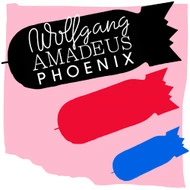2010 Grammy Award Winner for Best Alternative Music Album!
While it's true that you have to wait for inspiration to strike, theres comfort in knowing it will inevitably arise, even if you have to look all over the globe for it before you find it or so goes the logic behind the epic recording process of Phoenix's studio album.
To write their album, titled Wolfgang Amadeus Phoenix and released on Glassnote Records and Loyaute (the bands own imprint), the Gallic quartet decamped to various locales away from their home studio in Versailles, searching for the stimulus necessary to transform the material into a coherent LP. "We spent a long time waiting for the chemical reaction," says guitarist Laurent Brancowitz, "that moment when a song isn't just the sum of all of our parts, but it's something more. And the idea was to go someplace we'd never been." Actually, they went to a few: Brancowitz and his bandmates Thomas Mars (vocals), Christian Mazzalai (guitar), and Deck D'Arcy (bass) worked in the Parisian studio of 19th-century Romantic painter Théodore Géricault ("The light was beautiful," Brancowitz says), chartered a houseboat on the Seine ("Not the best idea some of us got seasick"), and stayed at the Bowery Hotel in New York City for a month, among others. As the guitarist explains with self-effacing humor, "It was like our Orson Welles moment."
As you'd expect, the traveling took its toll, leaving only a trip back from whence they came as a means of allowing the songs to gel, this time in the Montmartre home of Philippe Zdar, the producer known for his work as half of French house duo Cassius. Zdar, a longtime friend, lent Phoenix his studio and wound up producing the record alongside the band the first time Phoenix has recruited outside help. "He's very European, very dramatic," says Mars. "We worked in his studio for a year and a half, so he was around the songs. He had a lot of good comments that helped shape them. There was no in between with him; either the songs were great or we'd ruined them. Every day was either time to open a bottle of Champagne or to go home depressed."
The results collected on Wolfgang demonstrate a kind of deliberate, considered approach, and in turn, they created what is the best album in their already-amazing catalogue. Featuring the band's signature melding of synthetics and organics, of sharp, danceable rhythms and intense guitars, of effortless melody with a considerable dose of aural panache, the album's ten songs are more layered than previous efforts. "On our last album, we were trying to make a minimalist record something austere, almost ascetic," Brancowitz explains. "This time we wanted to create something more elaborate." That's evident on electro-tinged slow jams like "Fences," the sweeping and mostly instrumental "Love Like a Sunset," and the spirited pop of lead-off track "Lisztomania," on which Mars sings the transcendent chorus, "Like a riot, like a riot, oh!/ I'm not easily offended/ It's not hard to let it go/ From a mess to the masses." On first listen, his lyrics might seem obscure, but Mars definitely intends to reference the Hungarian composer: "Franz Liszt was the rock star of his day," he explains. "Other musicians hated him for getting all the girls; his concerts were out of control. This song's about playing live, the romantic beauty of a crazy crowd...and about the loneliness of still being one in a group of many."
The four men of Phoenix are a close-knit group of childhood friends from Versailles. The foursome have deep roots in the modern French music scene: Brancowitz, for instance, who is Mazzalai's older brother, played in a band called Darlin' with Guy Manuel de Homem-Christo and Thomas Bangalter, later to become Daft Punk. Phoenix, meanwhile, was formally founded after they performed backing Air for a few shows in the UK. Mars also sang the vocal on Air's "Playground Love" which appeared on the soundtrack to The Virgin Suicides (the film introduced him to his girlfriend, Sofia Coppola). The band then released their debut, United, whose song "Too Young" became an underground hit when Coppola used it in Lost in Translation.
Features:
Vinyl
Free HD-Vinyl-mp3 High Bit-Rate Files Ripped Directly from the Vinyl Test Pressings to mp3! (Limited Time Only)
Selections:
1. Lisztomania
2. 1901
3. Fences
4. Love Like A Sunset Part I
5. Love Like A Sunset Part II
6. Lasso
7. Rome
8. Countdown
9. Girlfriend
10. Armistice
While it's true that you have to wait for inspiration to strike, theres comfort in knowing it will inevitably arise, even if you have to look all over the globe for it before you find it or so goes the logic behind the epic recording process of Phoenix's studio album.
To write their album, titled Wolfgang Amadeus Phoenix and released on Glassnote Records and Loyaute (the bands own imprint), the Gallic quartet decamped to various locales away from their home studio in Versailles, searching for the stimulus necessary to transform the material into a coherent LP. "We spent a long time waiting for the chemical reaction," says guitarist Laurent Brancowitz, "that moment when a song isn't just the sum of all of our parts, but it's something more. And the idea was to go someplace we'd never been." Actually, they went to a few: Brancowitz and his bandmates Thomas Mars (vocals), Christian Mazzalai (guitar), and Deck D'Arcy (bass) worked in the Parisian studio of 19th-century Romantic painter Théodore Géricault ("The light was beautiful," Brancowitz says), chartered a houseboat on the Seine ("Not the best idea some of us got seasick"), and stayed at the Bowery Hotel in New York City for a month, among others. As the guitarist explains with self-effacing humor, "It was like our Orson Welles moment."
As you'd expect, the traveling took its toll, leaving only a trip back from whence they came as a means of allowing the songs to gel, this time in the Montmartre home of Philippe Zdar, the producer known for his work as half of French house duo Cassius. Zdar, a longtime friend, lent Phoenix his studio and wound up producing the record alongside the band the first time Phoenix has recruited outside help. "He's very European, very dramatic," says Mars. "We worked in his studio for a year and a half, so he was around the songs. He had a lot of good comments that helped shape them. There was no in between with him; either the songs were great or we'd ruined them. Every day was either time to open a bottle of Champagne or to go home depressed."
The results collected on Wolfgang demonstrate a kind of deliberate, considered approach, and in turn, they created what is the best album in their already-amazing catalogue. Featuring the band's signature melding of synthetics and organics, of sharp, danceable rhythms and intense guitars, of effortless melody with a considerable dose of aural panache, the album's ten songs are more layered than previous efforts. "On our last album, we were trying to make a minimalist record something austere, almost ascetic," Brancowitz explains. "This time we wanted to create something more elaborate." That's evident on electro-tinged slow jams like "Fences," the sweeping and mostly instrumental "Love Like a Sunset," and the spirited pop of lead-off track "Lisztomania," on which Mars sings the transcendent chorus, "Like a riot, like a riot, oh!/ I'm not easily offended/ It's not hard to let it go/ From a mess to the masses." On first listen, his lyrics might seem obscure, but Mars definitely intends to reference the Hungarian composer: "Franz Liszt was the rock star of his day," he explains. "Other musicians hated him for getting all the girls; his concerts were out of control. This song's about playing live, the romantic beauty of a crazy crowd...and about the loneliness of still being one in a group of many."
The four men of Phoenix are a close-knit group of childhood friends from Versailles. The foursome have deep roots in the modern French music scene: Brancowitz, for instance, who is Mazzalai's older brother, played in a band called Darlin' with Guy Manuel de Homem-Christo and Thomas Bangalter, later to become Daft Punk. Phoenix, meanwhile, was formally founded after they performed backing Air for a few shows in the UK. Mars also sang the vocal on Air's "Playground Love" which appeared on the soundtrack to The Virgin Suicides (the film introduced him to his girlfriend, Sofia Coppola). The band then released their debut, United, whose song "Too Young" became an underground hit when Coppola used it in Lost in Translation.
Features:
Vinyl
Free HD-Vinyl-mp3 High Bit-Rate Files Ripped Directly from the Vinyl Test Pressings to mp3! (Limited Time Only)
Selections:
1. Lisztomania
2. 1901
3. Fences
4. Love Like A Sunset Part I
5. Love Like A Sunset Part II
6. Lasso
7. Rome
8. Countdown
9. Girlfriend
10. Armistice




 Turntable Accessories
Turntable Accessories Headphone Accessories
Headphone Accessories Cable Accessories
Cable Accessories Vinyl Accessories
Vinyl Accessories Compact Disc Accessories
Compact Disc Accessories







